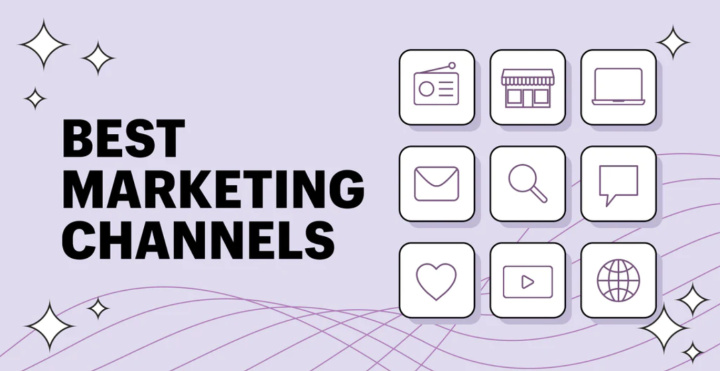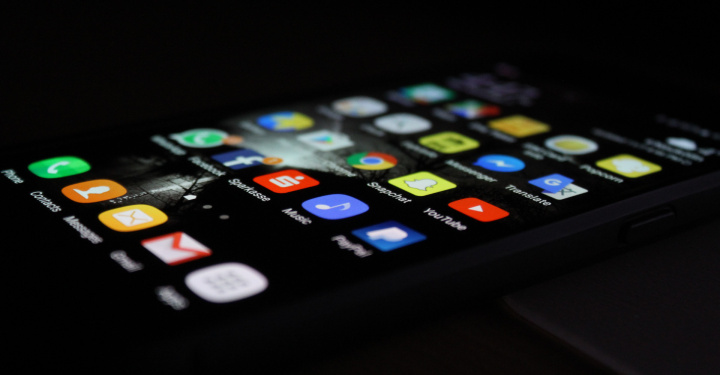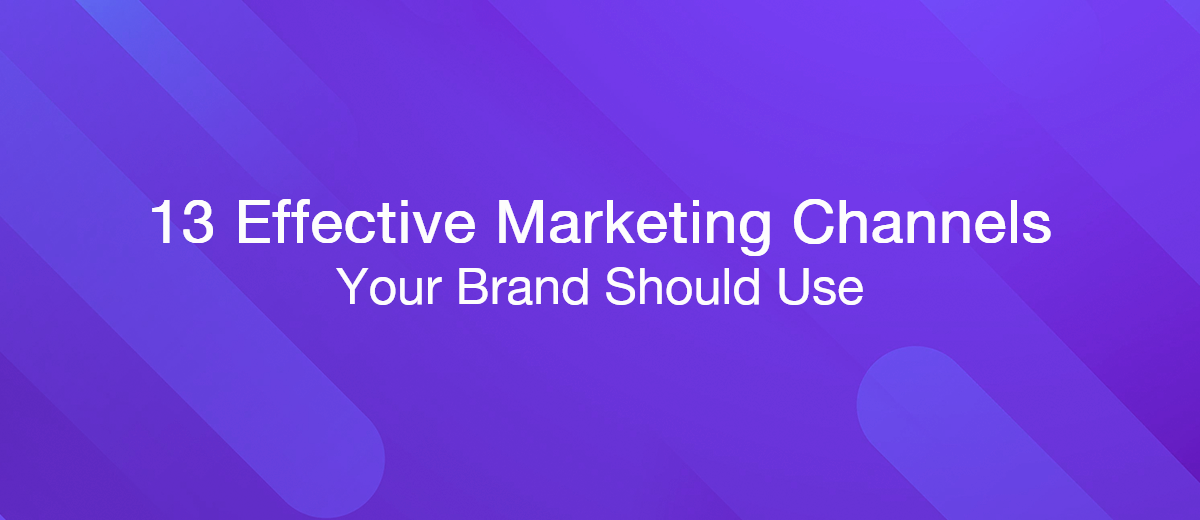13 Effective Marketing Channels Your Brand Should Use
This guide will tackle effective marketing channels for brands – what they are and why they should matter to you (and everyone who owns or works at a company).
Don't Get Lost in the Variety of Options and Trends
It can be easy to get lost in the noise of marketing channels. With so many strategies out there for success, it can be hard to identify what will work best for your brand. The reality is that there's no way for anyone to keep up with them all, but it's important to remember that every channel has its own unique strengths and weaknesses. And if you don't think about each one holistically, it'll be hard for your brand to get anywhere near the success it deserves.
It doesn't matter what you think your competitors are doing or what the latest trends in the industry are because following any of those things will lead to failure. Likewise, what works for one brand might not work for another, and vice versa – so it's up to you to discover how your brand can create an identity and make customers love it!
13 Effective Marketing Channels for Brand Promotion
Marketing channels are the ways you can reach your potential customers. It's about communicating with them in a way that reaches them where they're at, encourages them to buy your product, and then ensures they have an experience that drives their friends and family to do the same.

So if you're looking for inspiration on how best to market your brand, these 13 marketing channels can help:
Social Media Marketing
Social media is a great way to connect with customers, whether looking for the best way to engage with your existing audience or reach new potential customers. In addition, social media's popularity makes it an effective marketing channel: according to Business2Community, 92% of consumers trust recommendations from friends and family over advertisements.
It's easy to use social media as part of your strategy because it's ubiquitous. No barriers or costs are associated with setting up a profile or posting content on these platforms. With that being said, it's important not only to have a strategy in place, but also to make sure that you're using the right channels for your brand. If everyone is using Twitter, but your target audience hangs out more often on Facebook groups than they do on Twitter feeds – it may not be worth devoting as much time there!
Email Marketing
Email marketing is a great way to reach your customers. You can send them announcements, promotions, and special offers that they'll be more likely to open than if you were sending them through other channels. But it's also an incredibly effective way of building customer relationships! An email strategy that regularly engages with your audience can help you build trust. And the more trust you have in a relationship, the more likely they will buy from you again.
Email marketing is also built into our lives; whether at work or home, there's always an app on our phone reminding us about emailing someone or checking for new ones in our inboxes (even if we try not to). This makes it super easy for people who want to stay connected but need more time during their day – like traveling salespeople who need information quickly without having Wi-Fi access all the time.
Bonus tip: “To use an SSL certificate for email marketing, you will need to install the certificate on your email marketing server and configure your server to use SSL for outgoing emails. Some email marketing services may offer SSL certificates as part of their service and handle the installation and configuration for you.”
Content Marketing
Content marketing requires carefully producing and distributing information to draw attention to, engage, and convert readers into customers. Utilizing this marketing channel to inform your audience is a tried-and-true strategy. Therefore, it not only helps you establish your expertise in the area, but it also swiftly increases brand recognition.
Do you want to master content marketing? Begin by speaking with your target customers to ascertain their problems and any inquiries they may have regarding your good or service. Then, make a plan to respond to these inquiries from there. But keep in mind that this marketing channel also has other requirements besides content development. For example, you'll also need to figure out how to share every piece of material you produce.
You can only connect with your audience in this way. Consequently, name a few more marketing platforms you'll use to spread your material. Examples of this goal include email marketing, Q&A websites, and social media.
SEO
Search engine optimization (SEO) is a great way to get more traffic to your website. It's a long-term strategy and takes time, but if done correctly, it can help you rank higher on search engines like Google, Bing, and Yahoo. If you have the budget, you'll want to invest in an SEO consultant or agency.
Natural search traffic is free, making organic marketing one of the most cost-effective digital marketing channels. For example, when someone searches for "how do I grow my business" on
Google or Bing and clicks through from one of the results at the top
of the search results page (SERP) – that's free natural traffic!
Paid Search Advertising
Paid search advertising is purchasing a keyword to appear at the top of a search results page. This can be an effective way to reach a large number of people and drive traffic to your website or landing page. There are many ways to use paid search advertising, but the most common one is when you want to drive people directly to your landing page (the first place they land once they click on the ad).


Paid searches can also be used in other areas, such as retargeting campaigns (showing ads based on someone's previous activity online), lead generation, brand awareness campaigns, etc. Alongside paid advertising, you may consider working with high-quality lead generation services and companies that will help to improve your business's visibility.
Influencer Marketing
Influencer marketing is a form of paid media that targets people with an extensive network of followers on social media, including Instagram, Facebook, and YouTube. Influencers are usually bloggers or vloggers – people with blogs or video channels sharing their opinions with thousands to millions of followers.
Influencers can either be micro-influencers (with less than 1,000 followers) or macro-influencers (with over 100k followers). They can be celebrities, bloggers/vloggers, or even industry experts with a sizable following. How to find the right influencers for your brand:
- Do research on potential niche keywords related to your products/services that people might search while looking into buying them (especially ones related to pain points!).
- This will help provide insight into what topics might resonate most strongly with users based on real searches made by previous customers who have already purchased similar items through eCommerce platforms like Amazon before deciding what types of materials need replacing next time.
- Use tools like Google Trends to see which terms people are most commonly searching for online across specific regions so that you can tailor creative campaigns accordingly.
Mobile Marketing
Mobile devices are the most popular way to connect with people. According to a Pew Research Center study, mobile users outnumber desktop users, making it one of the most valuable marketing channels for businesses. The same survey found that 91% of Americans own a smartphone, and almost half use their phones for activities related to work daily.

If you have any doubt about the value of mobile marketing, think about your habits: when was the last time you used your phone? Was it at home? In front of the TV? At work or in bed? Chances are good that you were reaching for your phone as soon as someone mentioned an idea or question on social media or emailed you containing information that might help with whatever task you're working on at that moment (like finding a good place for lunch).
Referral Programs
Referral programs are great for getting people to talk about your brand. This can be in word-of-mouth marketing and generating leads and sales. The idea is that customers will refer the brand to their friends in exchange for a reward. This can be anything from a discount on their next purchase to a free product or service. You may even have a limited-time offer for those who come through your referral program.
The key to a successful referral program is to make it easy for customers to access and use. You don't want them struggling through complicated steps to get rewards – if you do, they'll likely give up before logging in.
You also need to have a clear incentive for referring customers. If they're not getting something in return, they won't bother with the program, nor will their friends. It can be tempting to offer up free products or services as a reward, but this might not be enough motivation for your audience. So instead, you'll want them to feel like they're getting something out of referring to their friends and family – this could be anything from discounts on future purchases to gifts and other perks.
Affiliate Marketing
Affiliate marketing is a fantastic way to make money online, especially if you have a product or service that appeals to a niche audience. However, it can be tricky to set up and manage. If you're interested in using affiliate marketing as one of your marketing channels for your business, follow these steps:
- Determine whether your product or service would be appropriate for affiliate programs.
- Decide on the commission rate (the amount you'll pay each time someone purchases through an affiliate link). Ensure it's high enough that affiliates will want to participate, but low enough, so customers can make their purchases.
- Create an affiliate program page on your website with instructions on how new affiliates should sign up, what products/services they can promote, etc. Hence, potential partners know what they're getting into before committing themselves professionally by partnering with you online!
Visual Content Marketing
Visual content marketing is a great way to connect with your audience. Visual content is more engaging than text and can be easier for your audience to understand. It's also easier for you to create, which means less time spent creating content and more time focusing on the important things like growing your business or other activities that will help grow your brand and achieve your business goals.
Visual content marketing can be used for social media, website, and email marketing. If you're interested in creating visual content for social media posts, check out Visme or Piktochart, which have templates/designs that you can customize to fit your brand's look!
Traditional Print Ads and Magazine Features
Traditional print media is still a great way to get your brand in front of your customers. Print media can effectively target a specific audience and is also one of the most powerful ways to build your brand's reputation.
Many brands still use print ads as they look for ways to engage with their customers and drive sales, especially among older consumers who have remained loyal customers.
TV and Radio Ads
TV and radio ads are the most effective way to reach a wide audience. It's estimated that 41% of all ads spend goes toward television advertising alone. You can expect to get around $3 for every dollar spent on TV advertising; however, this number will vary depending on your industry and how much competition there is in the market.
If you have the budget, running TV ads can be a great way to reach consumers who are not online. The same goes for radio ads. While most people access the internet daily, not everyone spends time browsing Facebook or Twitter.
So if your brand has a presence outside social media, these advertisements can help you reach new customers and keep your current ones engaged.
Omnichannel Marketing
This marketing channel leverages numerous mediums to give your audience a consistent experience. The idea is to advertise your company and provide customer service using branded images and coherent messages. How can a strategy like this benefit you, then? A few different ways, like:
- Expand your reach. Customers may discover you on various platforms and begin to recognize you immediately.
- Improved Brand Trust. Customers begin to trust you more when they see you on several platforms.
- Boosts Your Revenue. Customers can swiftly resolve their problems with simplified customer service, improving their earnings. Not to mention that omnichannel marketing helps you build trust, which boosts sales.
There are two key elements that omnichannel marketing needs to be successful. One demonstrates your brand personality and is a brand voice guideline. To ensure that everyone on the team utilizes it consistently across channels, please record two: a distinctive visual style. Once more, note this. Additionally, be sure to develop any marketing materials in accordance with this branding.
Conclusion
The marketing world is constantly changing. So, the most important thing you can do is to keep up with it and keep your brand on top of the trends. These 13 channels are the best ones right now, but new ones will emerge in the future, so be sure to stay ahead!
Do you want to achieve your goals in business, career and life faster and better? Do it with ApiX-Drive – a tool that will remove a significant part of the routine from workflows and free up additional time to achieve your goals. Test the capabilities of Apix-Drive for free – see for yourself the effectiveness of the tool.

